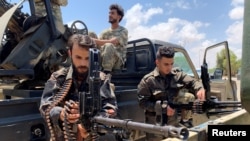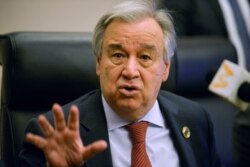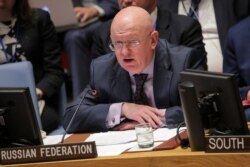The U.N. Secretary-General warned Wednesday that “time is not on our side” in Libya, saying the conflict has entered a new phase, with foreign interference reaching “unprecedented levels.”
“The United Nations will continue working with the parties to reach a cease-fire and resume a political process,” Antonio Guterres told a high-level virtual meeting of the Security Council.
He said external interference includes the ongoing delivery of sophisticated equipment and mercenaries — both of which violate a U.N. arms embargo on Libya.
In recent weeks, forces of the U.N.-recognized Government of National Accord (GNA) have made progress in beating back a 14-month-long offensive on the capital, Tripoli, by renegade commander Khalifa Haftar of the Libya National Army (LNA) and his fighters. The GNA has also taken over of an airbase and two strategic towns in the northwest.
Haftar has retreated east to the coastal city of Sirte, with the GNA in pursuit.
“GNA units, with significant external support, continued their advance eastward, and are now 25 kilometers west of Sirte after two previous attempts to gain control of the city,” Guterres said.
He said the situation on the front lines has been mostly quiet for the past month.
“However, we are very concerned about the alarming military buildup around the city, and the high level of direct foreign interference in the conflict in violation of the U.N. arms embargo, U.N. Security Council resolutions and commitments made by member states in Berlin.”
In January, Berlin hosted an international conference for Libya that yielded a joint communiqué acknowledging that there can be no military solution in Libya. All participants agreed to refrain from interference in the country’s armed conflict and internal affairs. The parties also agreed to “unequivocally and fully respect and implement” a U.N. arms embargo.
But six months later, there seems to be little implementation of the Berlin commitments.
Many of the states that have violated the arms embargo — either blatantly or discreetly — spoke at the virtual council meeting. Ministers from Turkey, Egypt, the United Arab Emirates and Qatar all declared their support for a cease-fire and a political solution, and demanded an end to foreign interference.
Permanent council member Russia dismissed accusations that its mercenaries are present in Libya.
“We stated on many occasions that there is not a single Russian military serviceman in the area of armed action in Libya,” Ambassador Vassily Nebenzia said. “Neither is there any credible data about Russian citizens who would be taking part in armed clashes in Libya.”
A leaked report written by U.N. sanctions monitors said in May that the private Russian military contractor, the Wagner Group, has had 800 to 1,000 Syrian mercenaries in Libya since October 2018 fighting with Haftar’s forces.
Libya’s U.N. envoy urged the council to sanction countries that send mercenaries to his country. He also called out the hypocrisy of some states.
“Today, we are hearing calls for reasoning, wisdom and dialogue, but by whom?” asked Libyan Ambassador Taher El-Sonni. “By states that were and are still supporting the aggressor secretly and publicly,” he said of those who support Haftar.






